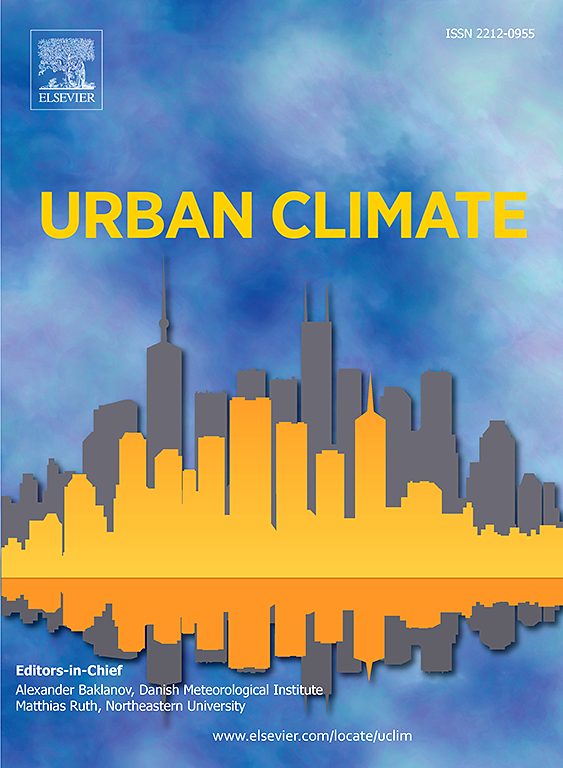基于局地气候带向导的城市微尺度模拟:概念和使用PALM模型系统的验证
IF 6.9
2区 工程技术
Q1 ENVIRONMENTAL SCIENCES
引用次数: 0
摘要
局部气候带(lcz)构成了城市和农村站点的分类系统,将物理特性和城市形态与特征近地表温度制度联系起来。我们开发了一个新的基于python的工具,称为LCZ-wizard,它允许基于与LCZ定义一致的小单元创建和自定义整个城市的物理表面特征。因此,我们能够生成并促进仅基于LCZ分类的城市微尺度气象模型,为传统的基于遥感的制图和原位测量方法研究城市微气候提供了补充。在本文中,我们利用LCZ-wizard提供的表面特性,评估了热浪条件下建筑解析PALM模型系统的性能。模拟结果表明,PALM对每个标准的空气温度和人体热舒适模式进行了模拟。此外,我们对德国柏林的一个现有城区进行了额外的模拟,其中一个模拟了现实的表面特征,另两个模拟了使用LCZ-wizard的半理想化的LCZ表面信息。比较表明,在典型lcz尺度上平均气温的日循环中,只有很小的变化和差异(0.17 K和0.34 K)。因此,我们可以验证LCZ-wizard在微尺度模拟中对城市环境进行系统调查的功能和适用性。因此,我们相信LCZ向导将成为城市气候研究的一个有价值的工具,例如,当缺乏三维地表特征的详细信息时,它可以仅基于LCZ地图进行高保真的小气候模拟。本文章由计算机程序翻译,如有差异,请以英文原文为准。
Urban microscale simulations based on a Local Climate Zone wizard: Concept and validation using the PALM model system
Local Climate Zones (LCZs) constitute a classification system for urban and rural sites, linking physical properties and urban morphology with characteristic near-surface temperature regimes. We developed a new python-based tool, called LCZ-wizard, that allows for creating and customizing physical surface characteristics of entire cities based on small units consistent with the LCZ definitions. Therewith, we are able to generate and facilitate microscale meteorological modeling of cities based on a LCZ classification only, providing an addition to traditional remote sensing-based mapping and in-situ measurement methods to study the urban microclimate. In this paper, we evaluate the performance of the building-resolving PALM model system under heatwave conditions, with surface properties provided by the LCZ-wizard. One simulation was performed for each standard LCZ, and results show that characteristic air temperature and human thermal comfort patterns were reproduced by PALM for each LCZ. Furthermore, we performed additional simulations for an existing city quarter in Berlin, Germany, one with realistic surface characteristics and two with semi-idealized LCZ surface information using the LCZ-wizard. The comparison reveals only small variations and differences (0.17 K and 0.34 K) in the diurnal cycle of air temperatures—when averaged over a typical LCZ-scale. Therewith we can verify the functionality and applicability of the LCZ-wizard for systematic investigations of urban environments in microscale simulations. We hence believe that the LCZ-wizard will be an valuable tool for urban climate research, e.g. by allowing high-fidelity microclimate simulations based on a LCZ mapping only, when detailed information on three-dimensional surface characteristics are absent.
求助全文
通过发布文献求助,成功后即可免费获取论文全文。
去求助
来源期刊

Urban Climate
Social Sciences-Urban Studies
CiteScore
9.70
自引率
9.40%
发文量
286
期刊介绍:
Urban Climate serves the scientific and decision making communities with the publication of research on theory, science and applications relevant to understanding urban climatic conditions and change in relation to their geography and to demographic, socioeconomic, institutional, technological and environmental dynamics and global change. Targeted towards both disciplinary and interdisciplinary audiences, this journal publishes original research papers, comprehensive review articles, book reviews, and short communications on topics including, but not limited to, the following:
Urban meteorology and climate[...]
Urban environmental pollution[...]
Adaptation to global change[...]
Urban economic and social issues[...]
Research Approaches[...]
 求助内容:
求助内容: 应助结果提醒方式:
应助结果提醒方式:


